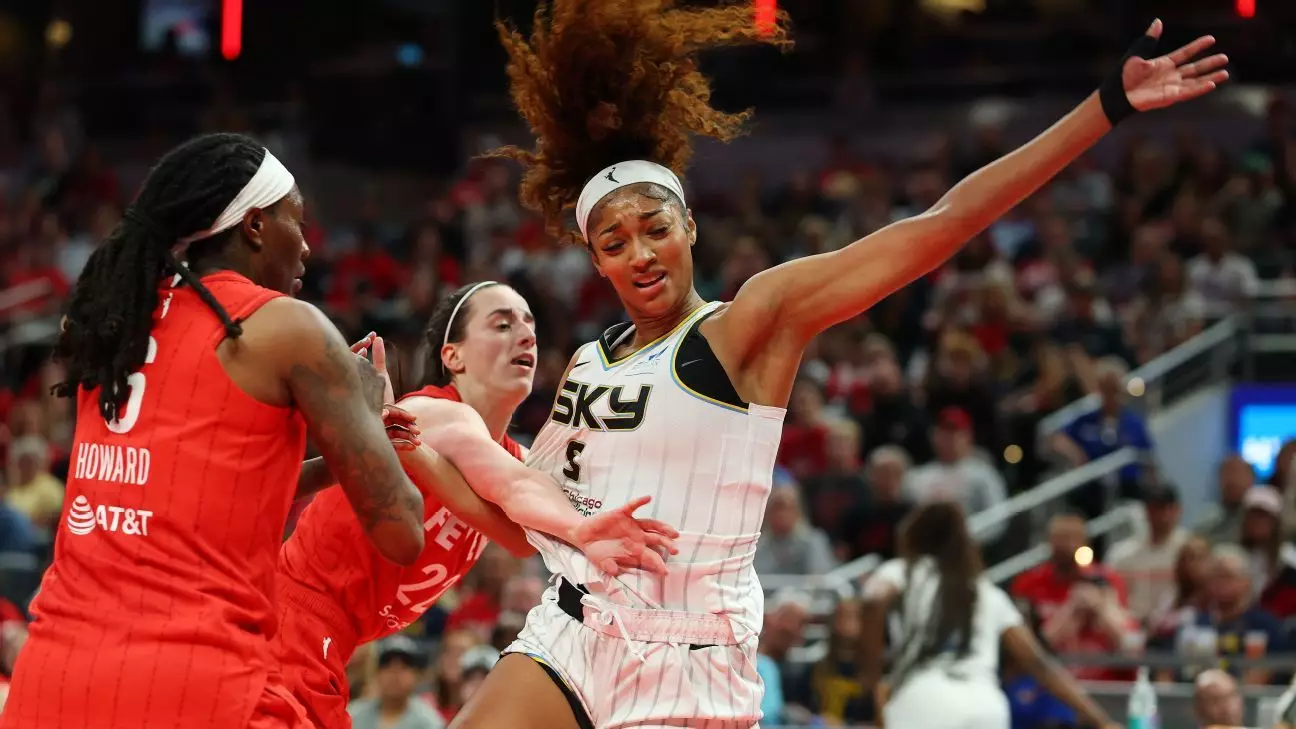The realm of sports, particularly women’s basketball, often becomes a battleground where talent meets prejudice and where athleticism is overshadowed by a toxic environment. Recently, during a game between the Chicago Sky and Indiana Fever, a disturbing incident ignited controversy when Angel Reese found herself the target of what the WNBA described as “hateful fan comments.” While such incidents are not new, the glaring spotlight on this particular event underscores deeply rooted issues within sports culture. As the WNBA initiates an inquiry into the allegations, a sobering truth emerges: the battle against hate in sports is far from over.
While many viewed the on-court skirmish between Reese and Caitlin Clark as a mere sports altercation, it quickly morphed into something uglier once the camera panned to the stands. As Reese faced the crowd during foul shots, the booing became increasingly hostile, showcasing an undercurrent of animosity that often rears its head against Black female athletes. The WNBA’s calling out of this incident signifies that such dehumanizing behavior must not be tolerated. As fans and players alike grapple with this dark moment in the league’s history, we must reckon with the systemic issues that fuel these hateful practices.
Words Matter: The Role of Language in Sports
Sporting arenas are often considered the last bastions of raw emotion where loyalty and passion blend seamlessly. However, fans wielding hateful language betray the very spirit of sportsmanship and camaraderie. The WNBA’s robust stance against racism, discrimination, and hate, encapsulated in their “No Space for Hate” policy, is both commendable and long overdue. Yet, it prompts a question: why have such atrocious comments found space in sports culture in the first place?
When athletes of diverse backgrounds display their talent, they amplify societal inequalities that remain entrenched. The affront directed at Angel Reese is not just a personal attack; it reflects broader societal issues of racism and misogyny directed at women in sports. The emphasis on community and inclusivity must go hand-in-hand with a serious consideration of the narratives we build around athletes. Sports should unite people from varied walks instead of breeding a hostile environment that alienates and ostracizes individuals based on race and gender.
The Influence of Leadership
Leadership in sports institutions is crucial for change. WNBA Commissioner Cathy Engelbert’s strong declarations serve as an important foundation, but words alone cannot dismantle these ingrained prejudices. As the WNBA continues its investigation, it must not only address individual incidents of hate but also re-evaluate its broader approach towards fan engagement and cultural education.
The league’s commitment to creating a safe environment must translate into actionable strategies, such as educational programs aimed at transforming fan attitudes and dismantling toxic behaviors. This is not merely about enforcing punishment; it’s also about fostering understanding and empathy. By recognizing that rights extend beyond the court, the organization demonstrates its role as a societal leader rather than merely a sports league.
Unity Through Adversity
Despite the chaotic atmosphere, instances like these provide a unique platform for unity. The responses from Reese and Clark suggest an emerging maturity among players, highlighting the need for solidarity in the face of hate. Statements hinting at the trivialization of their on-court clash indicate a refusal to allow negativity to define their sport.
As the WNBA players’ association supports the inquiry, it is worth noting the importance of the collective voice. Player unity extends beyond personal grievances, tapping into a larger framework of advocacy for justice in sports. By standing together, athletes can redefine the environment of the arenas they occupy, pushing back against the forces that seek to undermine their dignity.
The future of the league lies not just in its ability to showcase star athletes but in its commitment to combat hate culture with relentless determination. The WNBA must harness this moment, turning the tide against offensive behavior and transforming its arenas into sanctuaries of respect and acceptance. In so doing, they can inspire future generations to understand that sports transcend mere competition; they represent an opportunity for social change and collective healing.



Leave a Reply